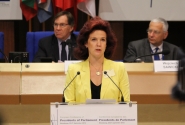
“People participate in elections when they trust their political leaders, when they are aware that their votes can make a change and if they appreciate the value of democracy in their well-being,” said Solvita Āboltiņa, Speaker of the Saeima, when addressing her counterparts during the discussion on the future of representative democracy held at the European Conference of Presidents of Parliaments on Thursday, 20 September. The Conference is currently taking place in Strasbourg, France.
Low trust in democratic institutions, low electoral turnouts and changing attitude towards political parties are current problems whose solutions have to be sought also by participants of the Conference. Furthermore, these solutions have to be sought at a time when we are overcoming the financial and economic crisis, stressed the Speaker in her address.
“The way of democratic governance is not an easy and simple one. Representative democracy is a complicated embodiment of state power. It does not offer ready-made answers, nor does it rely on a wise man who knows all the right choices. It is not one leader with unrestricted authority who decides on our future. It is the people and their representatives that have a say,” pointed out Āboltiņa.
On the one hand, representative democracy is a well-developed concept of governance. On the other hand, it has its own unique challenges. And the solutions usually are not to be found in a quick and easy manner because of the very essence of democracy – it requires participation, commitment, tolerance and an active civil society, emphasised Speaker Āboltiņa.
When discussing the future of the member states of the Council of Europe, Solvita Āboltiņa said: “More than half of countries represented here are members of the European Union, a project which was initiated almost at the same time as the Council of Europe. The visionaries of that time, despite the chaotic aftermath of the war, dared to offer six war-torn countries a unique exercise in renewing mutual confidence. Nowadays, it is much more difficult to propose and implement revolutionary ideas that would redefine time and space and that would subsequently intertwine European destinies. We live in a time when memories of the horrors of war have almost faded, and common achievements are taken for granted. Therefore, we have to define: What is the mission of the current generation and what is our role in succeeding at ensuring that future generations also live in peace and stability enjoyed by our children?”
The European Conference of Presidents of Parliaments is held once every two years, at the Council of Europe Headquarters in Strasbourg and at a member state of the Council of Europe alternately. Founded in 1949, the Council of Europe is the oldest political organisation in Europe, which currently brings together 47 European countries. The aims of the Council are to protect human rights, parliamentary democracy and the rule of law, to harmonise social and legal standards of its member states, as well as to promote understanding of European identity and values by embracing cultural diversity of European nations.
Saeima Press Service







